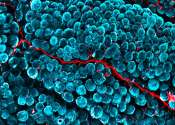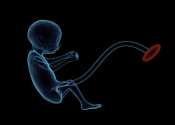More reference expression data
Insulin is a hormone that has extensive effects on metabolism and other body functions, such as vascular compliance. Insulin causes cells in the liver, muscle, and fat tissue to take up glucose from the blood, storing it as glycogen in the liver and muscle, and stopping use of fat as an energy source. When insulin is absent (or low), glucose is not taken up by body cells, and the body begins to use fat as an energy source, for example, by transfer of lipids from adipose tissue to the liver for mobilization as an energy source. As its level is a central metabolic control mechanism, its status is also used as a control signal to other body systems (such as amino acid uptake by body cells). It has several other anabolic effects throughout the body. When control of insulin levels fails, diabetes mellitus results.
Insulin is used medically to treat some forms of diabetes mellitus. Patients with Type 1 diabetes mellitus depend on external insulin (most commonly injected subcutaneously) for their survival because the hormone is no longer produced internally. Patients with Type 2 diabetes mellitus are insulin resistant, and because of such resistance, may suffer from a relative insulin deficiency. Some patients with Type 2 diabetes may eventually require insulin when other medications fail to control blood glucose levels adequately.
Insulin is a peptide hormone composed of 51 amino acids and has a molecular weight of 5808 Da. It is produced in the islets of Langerhans in the pancreas. The name comes from the Latin insula for "island".
Insulin's structure varies slightly between species of animal. Insulin from animal sources differs somewhat in 'strength' (in carbohydrate metabolism control effects) in humans because of those variations. Porcine (pig) insulin is especially close to the human version.









